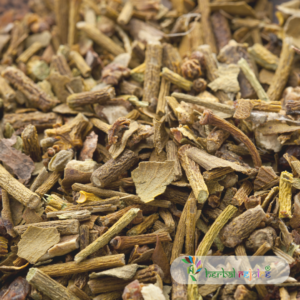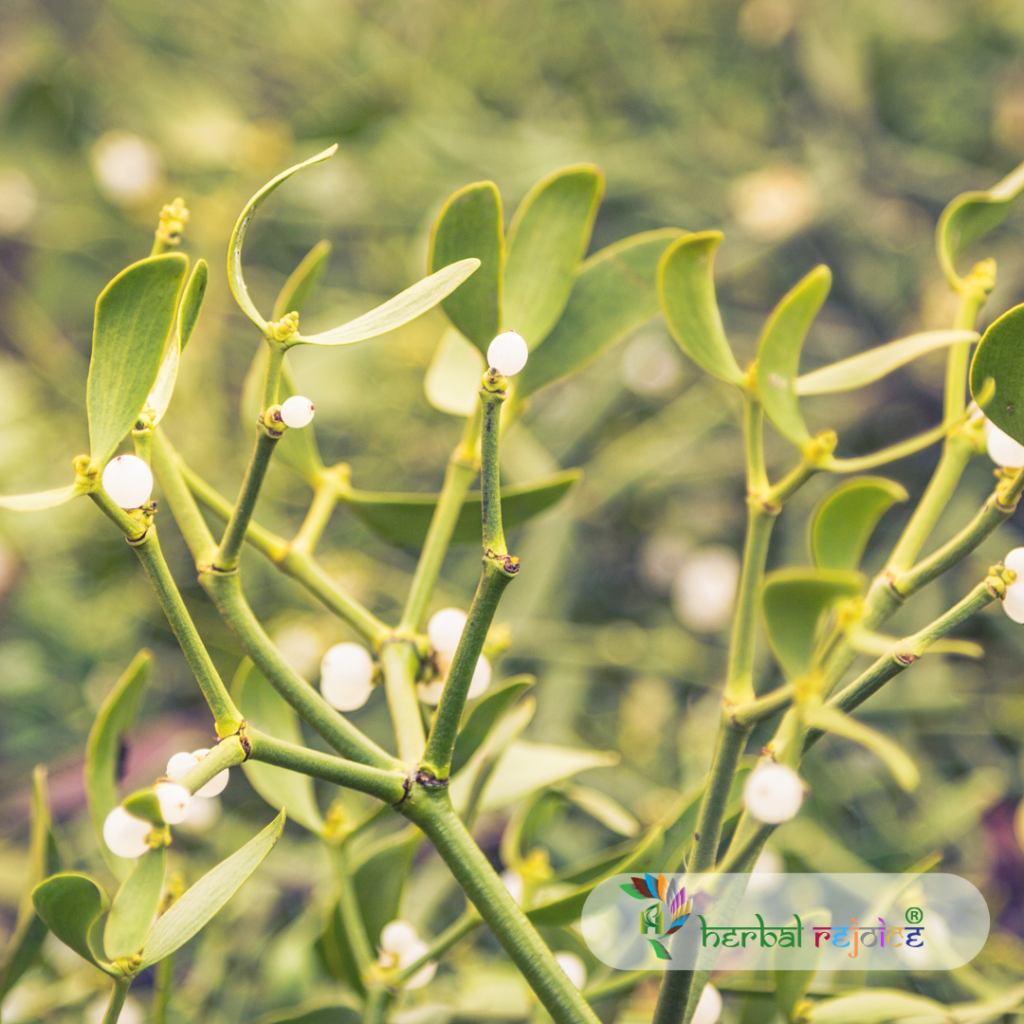Introduction
Viscum album Linn, also known as European Mistletoe, is a plant belonging to the Viscaceae; Loranthaceae family. It is found in the temperate Himalayas, specifically from Kashmir to Nepal, at elevations between 1,200 and 2,700 meters. This plant is considered semi-parasitic.
European Mistletoe has various traditional names in different languages. In Ayurveda, it is known as Bandaaka or Suvarnabandaaka. Another substitute name for it is Vrikshaadani. In Unani medicine, it is called Kishmish Kaabuli.
Health Benefits of Viscum album
This plant has several medicinal properties and actions. It acts as a vasodilator, cardiac depressant, and tranquilizer. It also stimulates the vagus nerve, which slows down the pulse rate. Additionally, it has anti-inflammatory, diuretic, immune-enhancing, and antineoplastic properties. It is commonly used to treat hypertension and tachycardia and is considered a nervine tonic.
The extract obtained from the leafy twigs of European Mistletoe has anti-inflammatory properties. It acts on capillary permeability and reduces edema. It also promotes granulation and the formation of new connective tissue.
One of the key applications of European Mistletoe is in the treatment of degenerative inflammation of the joints. It achieves this by stimulating cutivisceral reflexes following local inflammation caused by intradermal injections. It is also used as palliative therapy for malignant tumors through non-specific stimulation. This information is supported by the findings of the German Commission E.
Chemical Constituents
European Mistletoe contains various compounds that contribute to its medicinal properties. These include glycoproteins, flavonoids (particularly quercetin-derived), polypeptides, phenylcarboxylic acids, polysaccharides (such as viscid acid), alkaloids, and lignans. The cardiotonic activity of the plant is mainly due to the presence of lignans. The polysaccharides found in European Mistletoe stimulate the immune response. The antineoplastic activity of the plant is believed to contribute to the improved survival time of cancer patients. Polypeptides, specifically viscotoxins, have been found to inhibit tumors and enhance immune resistance.

Conclusion
In conclusion, European Mistletoe (Viscum album Linn) is a plant with various medicinal properties that have been recognized in traditional medicine systems such as Ayurveda and Unani. Its vasodilator, anti-inflammatory, and immune-enhancing properties make it useful in the treatment of conditions like hypertension, tachycardia, and degenerative joint inflammation. Further research is needed to explore its potential in cancer treatment.
Frequently Asked Questions
What is Viscum album Linn?
Viscum album Linn, also known as European Mistletoe, is a plant belonging to the Viscaceae; Loranthaceae family.
Where is Viscum album Linn found?
European Mistletoe is found in the temperate Himalayas, specifically from Kashmir to Nepal, at elevations between 1,200 and 2,700 meters.
What are the traditional names for Viscum album Linn?
In Ayurveda, it is known as Bandaaka or Suvarnabandaaka, and in Unani medicine, it is called Kishmish Kaabuli.
What are some medicinal properties of Viscum album Linn?
Viscum album Linn acts as a vasodilator, cardiac depressant, and tranquilizer. It also has anti-inflammatory, diuretic, immune-enhancing, and antineoplastic properties.
What is Viscum album Linn commonly used for?
Viscum album Linn is commonly used to treat hypertension and tachycardia. It is also considered a nervine tonic.
How does Viscum album Linn reduce inflammation?
The extract obtained from the leafy twigs of Viscum album Linn has anti-inflammatory properties. It acts on capillary permeability and reduces edema. It also promotes granulation and the formation of new connective tissue.
How does Viscum album Linn treat degenerative joint inflammation ?
Viscum album Linn stimulates cutivisceral reflexes following local inflammation caused by intradermal injections. This helps in the treatment of degenerative joint inflammation.
How is Viscum album Linn used in cancer treatment?
Viscum album Linn is used as palliative therapy for malignant tumors through non-specific stimulation. The plant’s antineoplastic activity is believed to contribute to the improved survival time of cancer patients.
What compounds are found in Viscum album Linn?
Viscum album Linn contains glycoproteins, flavonoids, polypeptides, phenylcarboxylic acids, polysaccharides, alkaloids, and lignans.
What is the cardiotonic activity of Viscum album Linn attributed to?
The cardiotonic activity of Viscum album Linn is mainly attributed to the presence of lignans.
How do the polysaccharides in Viscum album Linn affect the immune response?
The polysaccharides found in Viscum album Linn stimulate the immune response.
What is the role of polypeptides in Viscum album Linn?
Polypeptides, specifically viscotoxins, found in Viscum album Linn have been found to inhibit tumors and enhance immune resistance.
Has Viscum album Linn been recognized in traditional medicine systems?
Yes, Viscum album Linn has been recognized in traditional medicine systems such as Ayurveda and Unani.
How does Viscum album Linn treat hypertension?
Viscum album Linn acts as a vasodilator, helping to lower blood pressure in patients with hypertension.
Can Viscum album Linn be used to treat tachycardia?
Yes, Viscum album Linn is commonly used to treat tachycardia.
What is the potential of Viscum album Linn in cancer treatment?
Further research is needed to explore the potential of Viscum album Linn in cancer treatment.
Can Viscum album Linn be used as a diuretic?
Yes, Viscum album Linn has diuretic properties.
Is Viscum album Linn safe to use?
The safety of Viscum album Linn depends on the dosage and individual patient factors. It is always advisable to consult a healthcare professional before using any herbal remedy.
Are there any side effects of using Viscum album Linn?
Some individuals may experience side effects such as allergic reactions or gastrointestinal disturbances when using Viscum album Linn. It is important to monitor for any adverse reactions and consult a healthcare professional if necessary.


